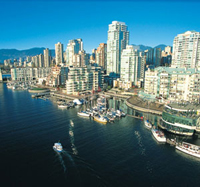Vancouver targets eco-crown as planet's 'greenest' city
 If you look at Vancouver from the Strait of Georgia it is hard to believe you are sailing into the greenest city in Canada.
If you look at Vancouver from the Strait of Georgia it is hard to believe you are sailing into the greenest city in Canada.From the upper deck of a B.C. Ferry on a sunny, cloudless day, you will see a ghastly blue haze drifting away from the city’s glistening towers, toward the Fraser Valley.
One of Vancouver’s biggest exports is smog, which has long been a sore point for people in neighbouring Abbotsford and Chilliwack. Those much smaller towns are surrounded by farmland and by rights should have cleaner air than the big city.
But Vancouver – which has its heart set on becoming the “greenest city in the world” by 2020 – has better air quality, because that’s the way the wind blows.
It’s not clear how much that helped in a recent study by the Economist Intelligence Unit, which rated Vancouver as the second greenest city in North America, and the greenest in Canada. But the city did get high ratings for its low CO2 emissions and high air quality.
Fancy that.
Of the 27 cities examined, only San Francisco rated better overall. The nearest Canadian challenger was Toronto, which came 9th on the index.
The EIU study, which was sponsored by Siemens, has drawn some criticism because the other Canadian cities (Calgary, Toronto, Ottawa and Montreal) all sprawl over much larger areas. The City of Vancouver is relatively small, with a population of 580,000 in an administrative area of just 114 square kilometres. By contrast, Toronto has 2.5-million people within its 641 square km and Calgary has a population of 1,090,000 in 725 square km.
It might not seem fair to compare little Vancouver, with its onshore breezes, to bigger cities with more stagnant air columns. But the study addresses that concern by noting “a combination of metropolitan and city-level data” are used in the index for all cities.
Any time anyone compiles a “best of” list there will always be critics of the methodology. It is clear by looking at the U.S. and Canada Green City Index, however, that the EIU has strived for accuracy and fairness. And until something else comes along, it must be regarded as the gold standard for measuring the “green-ness” of cities.
So, air pollution or not, Vancouver can rightly claim boasting rights to being the greenest city in Canada.
But don’t expect Vancouver to be satisfied with that.
City council recently adopted an ambitious action plan that aims to make Vancouver the world’s greenest city.
A report that went to council in July noted that development of the plan involved “thousands of hours of volunteer time … and input from more than 35,000 people.”
So it is a plan that has already engaged the public and focused city hall staff, which are two of the biggest obstacles in getting any such project launched.
The first goal of the plan is to double the number of green jobs in the city and to “secure Vancouver’s international reputation as a mecca of green enterprise.”
Goal number two – and this should come as good news to neighbours up the valley – is to reduce community-based greenhouse-gas emissions by 33 per cent. Other initiatives aim to reduce solid waste going to landfill or incinerator by 50 per cent, to increase the number of parks, to plant 15,000 new trees and to reduce Vancouver’s per capita ecological footprint by 33 per cent.
One of the other goals is to “breathe the cleanest air of any major city in the world,” but that – thanks to onshore breezes – may actually have already been accomplished.
In the U.S. and Canada Green City Index, Vancouver, with 81.3 points came very close behind San Francisco, which had 83.8 points. The two cities were virtually tied in several categories, but San Francisco took the lead because of better waste management.
If Vancouver implements its green action plan, its waste management score should shoot up, other categories will improve and it could soon be named the greenest city in North America. From there, “greenest in the world” does not seem impossible by 2020. But for now, looking at that blue haze, it is hard to believe.
By Mark Hume
You can return to the main Market News page, or press the Back button on your browser.

